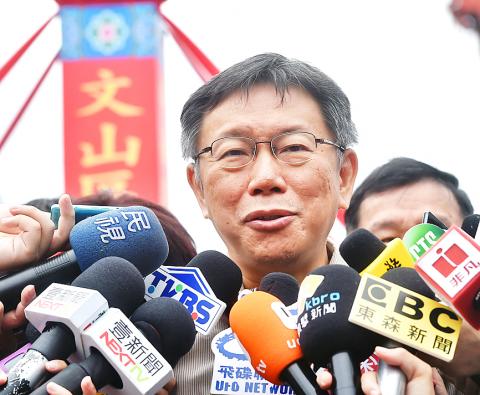Taipei Mayor Ko Wen-je (柯文哲) yesterday said he had agreed to lend his support to an eight-member alliance consisting of independent, third-force party and Democratic Progressive Party (DPP) candidates to boost their electoral chances in the capital.
According to a report by Chinese-language online news outlet Storm Media Group, the coalition — called the Capital Forward Alliance (首都進步大聯盟) — was formed following an agreement that the DPP would only nominate two legislative candidates — Taipei City Councilor Rosalia Wu (吳思瑤), who is running in Beitou-Shilin (北投-士林), and Legislator Pasuya Yao (姚文智), who is seeking re-election in Shilin-Datong (士林-大同) — while giving six other third-force and independent candidates the priority to run in the other six electoral districts.
The move was meant to follow the model Ko set in last year’s nine-in-one elections, in which Ko, an independent, beat his rival, the Chinese Nationalist Party’s (KMT) Sean Lien (連勝文), and overturned the political landscape in the traditional KMT stronghold, the report said.

Photo: Fang Pin-chao, Taipei Times
Aside from Wu and Yao, the six other alliance members are New Power Party’s Freddy Lim (林昶佐), Green Party-Social Democratic Party Alliance’s Fan Yun (范雲), People First Party Taipei City Councilor Vivian Huang (黃珊珊) and three independent candidates — Yang Shih-chiu (楊實秋), Billy Pan (潘建志) and Lee Ching-yuan (李慶元).
Although the DPP had courted Ko’s support, the Taipei mayor said the party did not force the decision on him, as he also felt a need to “topple the lofty walls of bipartisan politics” dominated by the pan-green and pan-blue camps.
Ko said he would like to see whether Taipei could break away from conflicts caused by political polarization and the practice of voting for certain parties, and promote support for candidates who are actively engaged in social issues.
“I have been pondering which path Taiwanese politics will take after last year’s elections. Should we go back to bipartisan politics?” he asked.
“Maybe Taiwan will be a more mature place for bipartisan politics in 20 to 30 years, but we have learned from the past 20 years that politics has been beset by ideological conflicts,” Ko said.
Commenting on the list of candidates, Ko said: “This is an interesting roster. There are DPP members, a KMT outcast and self-proclaimed ‘independents.’ It will make the elections more interesting.”
Ko said that the eight candidates present better choices than their peers, but he has not yet decided how he would show his support.
“Allow me a few days to think it over,” he said.
In related news, DPP presidential candidate Tsai Ing-wen (蔡英文) said she had not heard of the alliance.
“There are several constituencies in Taipei where we did not nominate candidates, and our campaign strategy committee will soon decide whether we should support particular candidates in these districts. If we decide to do so, we hope that these candidates would work with us in the future to promote reforms in the capital,” Tsai said. “If Mayor Ko would like to help, we would of course welcome his assistance.”
Meanwhile, Social Democratic Party Secretary-General Yeh Hung-ling (葉虹靈) said her party would wait to see how Ko would campaign for DPP-endorsed candidates before issuing an official response.
Additional reporting by Loa Iok-sin and Abraham Gerber

MAKING WAVES: China’s maritime militia could become a nontraditional threat in war, clogging up shipping lanes to prevent US or Japanese intervention, a report said About 1,900 Chinese ships flying flags of convenience and fishing vessels that participated in China’s military exercises around Taiwan last month and in January last year have been listed for monitoring, Coast Guard Administration (CGA) Deputy Director-General Hsieh Ching-chin (謝慶欽) said yesterday. Following amendments to the Commercial Port Act (商港法) and the Law of Ships (船舶法) last month, the CGA can designate possible berthing areas or deny ports of call for vessels suspected of loitering around areas where undersea cables can be accessed, Oceans Affairs Council Minister Kuan Bi-ling (管碧玲) said. The list of suspected ships, originally 300, had risen to about

DAREDEVIL: Honnold said it had always been a dream of his to climb Taipei 101, while a Netflix producer said the skyscraper was ‘a real icon of this country’ US climber Alex Honnold yesterday took on Taiwan’s tallest building, becoming the first person to scale Taipei 101 without a rope, harness or safety net. Hundreds of spectators gathered at the base of the 101-story skyscraper to watch Honnold, 40, embark on his daredevil feat, which was also broadcast live on Netflix. Dressed in a red T-shirt and yellow custom-made climbing shoes, Honnold swiftly moved up the southeast face of the glass and steel building. At one point, he stepped onto a platform midway up to wave down at fans and onlookers who were taking photos. People watching from inside

Japan’s strategic alliance with the US would collapse if Tokyo were to turn away from a conflict in Taiwan, Japanese Prime Minister Sanae Takaichi said yesterday, but distanced herself from previous comments that suggested a possible military response in such an event. Takaichi expressed her latest views on a nationally broadcast TV program late on Monday, where an opposition party leader criticized her for igniting tensions with China with the earlier remarks. Ties between Japan and China have sunk to the worst level in years after Takaichi said in November that a hypothetical Chinese attack on Taiwan could bring about a Japanese

The WHO ignored early COVID-19 warnings from Taiwan, US Deputy Secretary of Health and Human Services Jim O’Neill said on Friday, as part of justification for Washington withdrawing from the global health body. US Secretary of State Marco Rubio on Thursday said that the US was pulling out of the UN agency, as it failed to fulfill its responsibilities during the COVID-19 pandemic. The WHO “ignored early COVID warnings from Taiwan in 2019 by pretending Taiwan did not exist, O’Neill wrote on X on Friday, Taiwan time. “It ignored rigorous science and promoted lockdowns.” The US will “continue international coordination on infectious